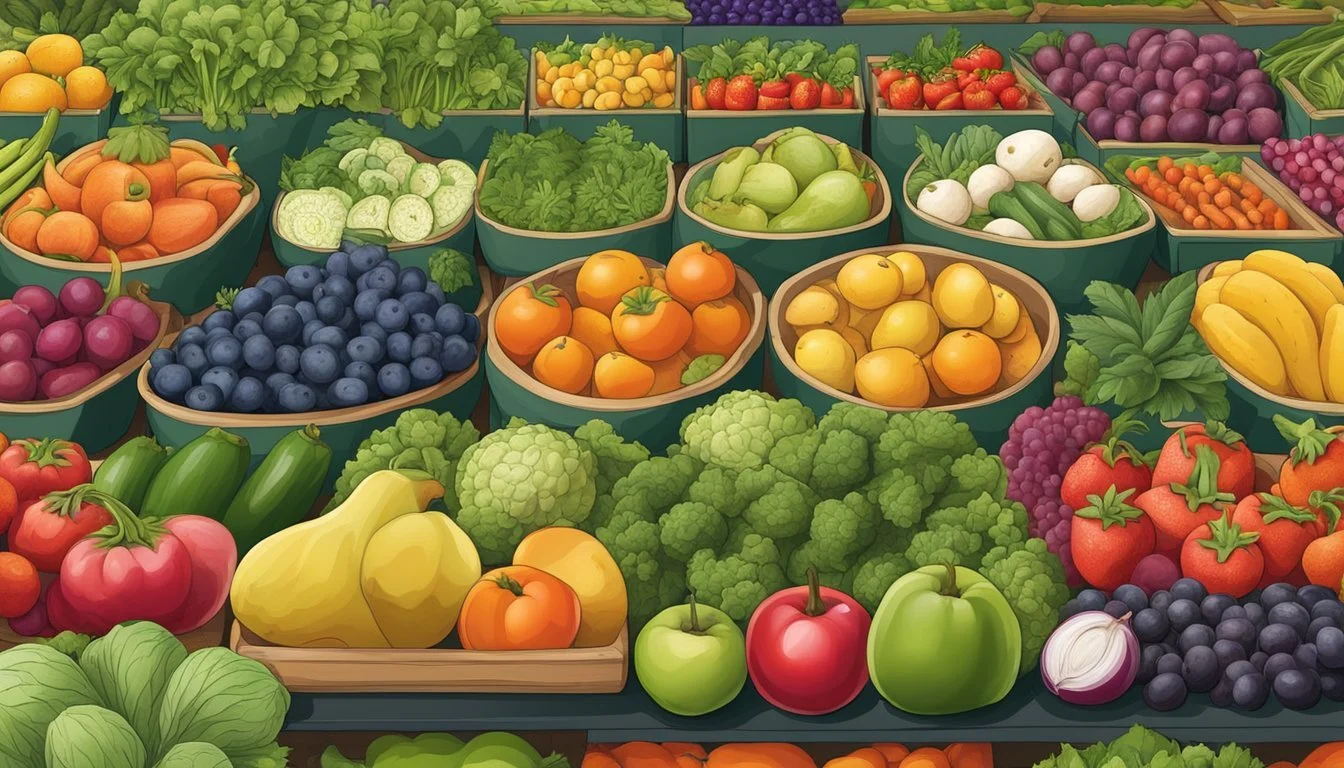The Best Farmers' Market Finds for a Plant-Based Diet
Top Selections for Fresh and Nutritious Eating
Farmers' markets are a treasure trove for individuals following a plant-based diet, offering an array of fresh produce essential for a healthful lifestyle. These markets, often bustling with activity from early morning, provide not just fruits and vegetables but also a variety of whole grains, legumes, nuts, and seeds directly from regional growers. The emphasis on seasonal and locally-sourced goods ensures that shoppers get the best quality ingredients which are ripe with nutrients. With the increasing interest in plant-based diets for health and environmental reasons, these markets have become vital for obtaining a diverse range of plant-based foods that are free from the processing and preservatives common in grocery store items.
Navigating through the colorful aisles of a farmers' market allows consumers to explore a variety of plant-based foods that can enrich their diet. Regular visits can be an educational experience as well, offering insights into the seasonality of produce and the chance to speak directly with farmers about sustainable agricultural practices. This direct interaction promotes a greater understanding of where food comes from and can inspire a deeper commitment to a plant-based diet.
Adopting a plant-based diet by utilizing farmers' markets not only supports local agriculture but also encourages a move towards a more sustainable and ethical eating pattern. Abundant in whole foods, these markets are key in promoting health by providing shoppers with nutrient-dense food choices. Those embracing a plant-based lifestyle will find farmers' markets to be an invaluable ally in maintaining their health goals while also discovering an ever-evolving palette of flavors and ingredients.
Understanding Plant-Based Diets
Plant-based diets are gaining popularity due to their association with numerous health benefits and positive environmental impact. This section breaks down the essentials of plant-based diets, including health and environmental benefits, and foundational principles.
Benefits for Health and Environment
Plant-based diets, which include a range of eating patterns from vegan and vegetarian to those incorporating some animal products, are linked to reduced risks of chronic diseases such as heart disease, diabetes, and certain types of cancer. These diets are typically rich in nutrients, fiber, and are lower in saturated fats.
Health Benefits:
Heart Disease: A diet high in fruits, vegetables, and whole grains can lead to lower cholesterol levels and blood pressure, both of which are risk factors for heart disease.
Diabetes: Plant-based diets can improve insulin sensitivity and potentially reduce the risk of developing type 2 diabetes.
Cancer: Diets emphasizing a variety of plant foods may offer protection against various types of cancer due to their high levels of antioxidants and fibers.
The environmental impact of plant-based diets is significant — they require fewer resources and result in lower greenhouse gas emissions compared to diets high in animal-based foods. A shift towards more plant-based dietary patterns can considerably reduce the strain on the planet's resources.
Plant-Based Diet Fundamentals
Fundamentally, plant-based diets focus on foods primarily from plant sources. This includes not only fruits and vegetables, but also nuts, seeds, oils, whole grains, legumes, and beans. It's not necessary to go completely vegan; even a diet that is predominantly plant-based can confer benefits.
Diet Varieties:
Vegan: Excludes all animal products, including dairy and eggs.
Vegetarian: Excludes meat, but may include dairy and eggs.
Whole-food Plant-Based Diet: Emphasizes whole, minimally processed plant foods.
In practice, individuals should aim for a variety of foods to ensure they receive a broad spectrum of nutrients. It's essential for individuals following these diets to plan appropriately to meet all their nutritional needs, especially for nutrients that are more readily available in animal products, such as vitamin B12, iron, and omega-3 fatty acids.
Key Nutrients in a Plant-Based Diet
When adopting a plant-based diet, one can obtain a wealth of essential nutrients from an array of fruits, vegetables, grains, nuts, and seeds. These foods can provide ample protein, fiber, vitamins, and minerals necessary for health and vitality.
Protein Sources Beyond Meat
Protein is essential for muscle repair and growth, hormone production, and overall health. While meat is a common protein source, a plant-based diet offers a variety of protein-rich alternatives. Legumes such as lentils, chickpeas, and black beans are significant protein contributors, with the added benefit of being nutrient-dense. Nuts and seeds, including almonds and chia seeds, also pack a protein punch. Tofu and tempeh (What wine goes well with tempeh?) serve as versatile protein foods derived from soybeans, accommodating various cuisines and preparation methods. Moreover, quinoa is a complete protein, meaning it contains all nine essential amino acids that the body cannot produce itself.
Fiber: The Key to Healthy Digestion
Fiber supports digestive health and can help regulate blood sugar levels. It is found in abundance in plant-based foods, especially in fruits, vegetables, and whole grains. Key sources include:
Fruits: Apples, berries, and pears
Vegetables: Leafy greens, carrots, and beets
Whole grains: Brown rice, oats, and barley
Legumes: Chickpeas, beans, and lentils
Incorporating these foods into one’s diet helps ensure a sufficient intake of fiber, keeping digestion smooth and contributing to overall well-being.
Vitamins and Minerals Essentials
A varied plant-based diet can meet daily requirements for most vitamins and minerals. Iron, necessary for oxygen transport in the blood, can be found in leafy green vegetables, legumes, and fortified cereals. It's important to consume vitamin C-rich foods like oranges and bell peppers alongside iron sources to enhance iron absorption. Plant foods are rich in an array of essential vitamins including vitamin C, E, and the spectrum of B vitamins.
For minerals, a plant-based diet offers calcium from fortified plant milks and leafy green vegetables, magnesium from nuts and seeds, and zinc from whole grains and legumes. These foods not only supply crucial minerals but are also typically high in antioxidants and phytonutrients, contributing to a robust and balanced diet.
Top Farmers' Market Picks for Plant-Based Dieters
Farmers' markets are a goldmine for plant-based dieters, offering a plethora of fresh produce, whole grains, and legumes that are essential for a nutritious diet. Navigating the stalls with an eye for variety and nutrient density ensures a bounty of healthful foods for the week ahead.
Fresh Vegetables and Leafy Greens
Farmers' markets abound with fresh vegetables and leafy greens, many of which are harvested at peak freshness. One can find vibrant kale and spinach among the greens, both of which are rich in vitamins A, C, K, and essential minerals. They serve as excellent additions to salads, smoothies, and stir-fries.
Fruit Selections: Berries to Citrus
The fruit section at a farmers' market is often a colorful display of nature's sweets, with berries like strawberries and blueberries offering high levels of antioxidants. Citrus fruits, packed with vitamin C, are perfect for a morning boost or as a tangy salad ingredient.
Legumes and Grains for Sustained Energy
Plant-based eaters should look for stalls that feature a variety of legumes and grains. Staples like beans, peas, and lentils are not only hearty and filling but also serve as excellent protein sources. Whole grains such as quinoa and brown rice complement legumes and provide sustained energy throughout the day.
Nuts and Seeds: Compact Nutritional Powerhouses
For a concentrated source of healthy fats and protein, plant-based dieters will find value in nuts and seeds. Almonds, walnuts, and chia seeds can be sprinkled on salads or oatmeal for a nutritional punch. These small yet mighty foods are versatile and convenient for snacking or enhancing meals.
Shopping and Storage Tips
Farmers' markets are excellent sources for fresh, plant-based foods. When shopping, one should focus on selecting high-quality produce, preserving its freshness and nutrients, and applying strategies to maintain budget-friendliness.
Selecting the Best Produce
When visiting a farmers' market, look for produce that is in season to ensure optimal freshness and nutrition. Seasonal fruits and vegetables not only taste better but are also typically more affordable. A good shopping list should prioritize these items. Inspect produce for firmness and a vibrant color, free from bruises and blemishes, as these are indicators of quality.
Maximizing Freshness and Nutrient Retention
After purchase, proper storage is crucial to maximize the lifespan and nutrient content of produce. Leafy greens should be stored in the refrigerator, wrapped loosely in a cloth or paper towel to absorb excess moisture. Most fruits fare best when kept at room temperature away from sunlight until they ripen, after which they should be refrigerated. For items like root vegetables, a cool, dark place will extend their shelf life significantly.
Budget-Friendly Shopping Strategies
To manage one's grocery bills effectively, consider buying in bulk when it comes to staples like beans and whole grains. Additionally, visiting the farmers' market close to closing time can result in discounts, as vendors are likely to offer reduced prices on produce that they don't want to take back. Incorporating frozen produce into one's shopping list can also save money without compromising nutrition, as these items are picked and frozen at peak ripeness.
Incorporating Superfoods into Your Diet
Superfoods offer concentrated nutrients beneficial for a plant-based diet. They are power-packed with vitamins, minerals, and antioxidants essential for health.
Super Greens: Kale, Spinach, and More
Kale and spinach are foundational superfoods rich in vitamins A, C, and K, as well as minerals like iron and calcium. These leafy greens can be a versatile part of one's diet, easily included in smoothies, salads, and cooked dishes. They serve not only as a nutritional powerhouse but also add a fresh, vibrant touch to meals.
Easy ways to incorporate kale and spinach:
Blend them in morning smoothies
Toss them into a hearty salad
Sautee for a nutrient-dense side dish
The Power of Berries and Nuts
Berries, such as blueberries and strawberries, and nuts, like almonds and walnuts, are nutrient-dense foods that can easily be incorporated into a plant-based diet. They are high in fiber, vitamins, minerals, and heart-healthy fats. Berries are known for their high antioxidant content, which can combat oxidative stress.
Suggested uses for berries and nuts:
Mix berries into oatmeal or yogurt
Add nuts to salads for crunch
Keep a berry and nut mix handy for snacks
Root Vegetables and Cruciferous Wonders
Root vegetables, like beets and carrots, along with cruciferous vegetables such as broccoli and Brussels sprouts, are flavorful superfoods with their own spectrum of nutrients. Beets are rich in nitrates which are good for blood pressure regulation, while carrots provide a wealth of beta-carotene, important for eyesight. These vegetables can be roasted, steamed, or incorporated into soups and stews, making them a staple in a wholesome, plant-based diet.
Ideas to include root vegetables and cruciferous vegetables in your meals:
Roast with olive oil and herbs
Shred raw beets and carrots for a crisp salad topping
Stir-fry with tofu and a savory sauce
Creative Plant-Based Recipes & Cooking Tips
Exploring farmers' markets can lead to a plethora of fresh ingredients that are perfect for crafting vibrant plant-based recipes. With the following cooking tips and recipe ideas, one can transform these fresh finds into nutritious and flavorful meals.
Simple Yet Delicious Salads
When creating salads, the key is in the freshness and variety of the ingredients. Farmers' market hauls often include crisp greens, colorful vegetables, and ripe fruits that can be tossed together to make:
Mixed Green Salad with Seasonal Fruit: Combine mixed greens like spinach and arugula with sliced strawberries, apples, or peaches. Top with a light balsamic vinaigrette.
Cucumber Tomato Salad: Dice cucumbers and tomatoes, add red onions, and toss with olive oil, lemon juice, salt, and pepper.
Hearty Soups and Stews
Fresh vegetables from the market can be transformed into heartwarming soups and stews. Soups are not only comforting but also a great way to experiment with combinations of seasonal produce:
Spiced Lentil Stew: Cook lentils in a rich tomato broth, adding in market finds such as carrots, potatoes, and greens like kale.
Butternut Squash Soup: Roast butternut squash until tender, puree with vegetable stock, season with ginger and nutmeg for warmth.
Sumptuous Plant-Based Desserts
Desserts made with ingredients from the farmers' market can be both indulgent and plant-based. Utilize fruits at the peak of their ripeness for desserts that are naturally sweet and flavorful:
Vegan Fruit Crisp: Combine seasonal fruits like blueberries or peaches with oats and a touch of maple syrup for a sweet topping. Bake until golden.
Chocolate Zucchini Cake: Shred fresh zucchini and mix into a chocolate batter for a moist cake that pairs surprisingly well with the rich cocoa flavor.
Meat Alternatives: From Tempeh to Tofu
Incorporating plant-based protein sources such as tempeh and tofu into meals adds a nutritious and satisfying element. These meat alternatives can be marinated, grilled, or sautéed and featured in a variety of dishes:
Grilled Tempeh Steaks: Marinate tempeh in soy sauce, garlic, and apple cider vinegar before grilling. Serve with a side of stir-fried market veggies.
Scrambled Tofu: Break tofu into crumbles, cook with turmeric, nutritional yeast, and your choice of vegetables for a protein-packed replacement to scrambled eggs.
The Role of Plant-Based Diet in Disease Prevention
Adopting a plant-based diet is associated with a variety of health benefits, particularly in the context of chronic disease prevention. Scientific studies indicate that this dietary approach can play a significant role in mitigating risks and managing symptoms of prevalent health conditions.
Combating Obesity and Inflammation
Obesity is directly linked to increased inflammation in the body. A plant-based diet, which is typically high in fiber, can help manage body weight. The inclusion of fruits, vegetables, whole grains, and legumes has been shown to reduce body mass index (BMI) and support the reduction of inflammatory markers. This connection is due to their nutrient density and low energy content which can promote satiety and decrease caloric intake.
Managing Blood Pressure and Cholesterol
Plant-based diets benefit cardiovascular health by assisting in the management of blood pressure and cholesterol levels. The diets are naturally lower in sodium and rich in potassium-rich foods, which contribute to blood pressure reduction. Additionally, these diets are typically low in saturated fats and devoid of cholesterol, which can help lower LDL (bad) cholesterol levels and maintain good HDL cholesterol. This effect comes from the inclusion of nuts, seeds, and legumes, as well as the reduction of animal-based foods.
Lowering Risks of Type 2 Diabetes and Heart Disease
People who follow plant-based diets tend to have a lower risk of developing type 2 diabetes and heart disease. This is attributed to improved insulin sensitivity and better blood sugar management from a high intake of dietary fiber and complex carbohydrates. Furthermore, nutrients like antioxidants and phytochemicals, found abundantly in plant foods, are essential in preventing plaque formation in the arteries, thus protecting against heart disease. The reduction in saturated fat intake by excluding animal products also plays a vital role in cardiovascular protection.
Sustainable Eating and Local Impact
Sustainable eating involves more than just choosing plant-based options; it also encompasses where and how the food is produced. Supporting local farmers and shopping at farmers' markets can lead to environmental benefits, while also providing fresh and nutritious options for a plant-based diet.
Supporting Local Farmers and Markets
Farmers' markets provide a direct channel for consumers to purchase fresh, locally-sourced produce, supporting the local economy and small-scale farmers. By choosing to shop at these markets, individuals contribute to the viability of local agriculture, ensuring a continued supply of diverse and high-quality produce within their community.
Benefits for farmers: Increased profits due to direct sales.
Community advantages: Local job creation and support for local businesses.
Seasonal Eating for Peak Nutrition and Taste
Eating seasonally ensures that consumers get the most flavorful and nutritious plant-based food available. Fruits and vegetables are at their peak quality and taste when harvested in the appropriate season. This practice also minimally involves the greenhouse gas emissions associated with food storage and transportation that occur when produce is out of season.
Nutritional content: Higher in foods harvested at their peak season.
Flavor: Enhanced when produce is fresh and naturally ripened.
Reducing Your Carbon Footprint
Opting for locally and seasonally sourced produce helps reduce one's carbon footprint significantly. The transportation of food over long distances is one of the key contributors to greenhouse gas emissions. By purchasing from local markets, the demand for imported foods decreases, thereby decreasing associated emissions.
Local impact: Shorter transportation distances mean lower carbon emissions.
Sustainable practices: Often, small-scale local farmers engage in more eco-friendly farming practices compared to large, industrial operations.







